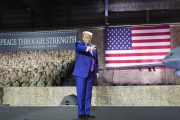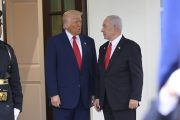
Infamous war lord and dictator Charles Taylor of Liberia — accused of mass murder, rape, war crimes, involvement in sex slavery, child abuse, torture, cannibalism, and much more — worked with the Central Intelligence Agency (CIA), according to an explosive report in the Boston Globe citing U.S. government documents.
Taylor, who is currently being held by international authorities in The Hague on war crimes charges, denied the accusation that he worked for the U.S. government. His lawyers have even threatened to sue the American newspaper which published the information for “libel.”
But according to documents obtained by the Globe under the Freedom of Information Act, the African dictator worked with the U.S. Defense Intelligence Agency (DIA) and the CIA starting in the early 1980s. The federal government refused to disclose details about the relationship under the guise of “national security.”
Evidence and Taylor’s own past testimony, however, suggest the bond between the mass murderer and U.S. intelligence agencies was a close one. And experts, meanwhile, were not surprised by the revelations.
In 1983, the budding despot, who had studied in the U.S. before being appointed to a high position within the new Liberian government, was accused in his homeland of embezzling around $1 million from the regime. He fled to the United States, where he was arrested and jailed pending extradition back to Liberia.
Incredibly, Taylor managed to “escape” from the maximum security prison in 1985. But according to Taylor and some of his former associates, he did not break out at all — he was secretly released by American agents, who picked him up in a getaway car and sent him back to Africa via Mexico for his next mission.
When Taylor returned to Africa, he reportedly went to Libya for training under the late dictator Moammar Gadhafi. By the late-80s, Taylor had built a ruthless rebel army known as the “National Patriotic Front of Liberia” (NPFL). Financing his brutal rampage with money from dictators such as Gadhafi and by other means, Taylor’s power continued to grow — all with U.S. government assistance, according to analysts.
After helping to overthrow the dictatorship ruling the nearby nation of Burkina Faso, Taylor and his rebels — based at that time in the Ivory Coast — eventually seized power in Liberia after a long and bloody civil war that began in 1989. He was actually elected President in 1997 by, according to reports, terrorizing the population with the threat of more bloodshed if he did not win the election.
It remains unclear exactly what Taylor was doing for American intelligence agencies during that time. Some experts and former spies suggested he was offering information on Gadhafi, who helped train and finance Taylor’s rebels and other guerrilla groups around the world. But others with knowledge of the situation said the relationship was much deeper than that.
Liberian Senator Prince Johnson, a former commander in the Liberian dictator’s rebel army, told a government commission in 2008 that U.S. intelligence agencies had encouraged Taylor to overthrow the existing regime of Samuel Doe — a tyrant who came to power in 1980 after a successful coup. Johnson eventually split from Taylor before marching into the capital, Monrovia, and torturing Doe to death.
Other experts have also alleged that U.S. intelligence agencies helped Taylor take over the country, which was founded in 1847 by freed American slaves who settled there. But official documents that might shed more light on the issue were withheld to protect American espionage methods and assets, according to the U.S. government.
Within two years of Taylor becoming President, multiple armed uprisings against his regime had seized control over vast swaths of the nation. Meanwhile, Taylor was buying weapons from the infamous arms dealer Viktor Bout — a former Soviet officer known as the “Merchant of Death” — and sending them to warlords in neighboring Sierra Leone, along with child soldiers.
Some 500,000 people were killed or brutally mutilated in the conflict, mostly civilians. But Taylor and his minions reportedly made a fortune trafficking so-called “blood diamonds” and selling weapons.
By 2003, the United Nations-backed “Special Court for Sierra Leone” issued an indictment against Taylor for war crimes and crimes against humanity. The international body alleged that Taylor had created or aided vicious rebel groups waging war in various African countries, forced children to serve in armed conflicts, harbored al Qaeda terrorists wanted in connection with the U.S. embassy bombings in Africa, and more.
The Liberian dictator pled not guilty to all of the charges, though he has also publicly begged for God’s forgiveness. A former death-squad commander in Taylor’s army even accused the dictator of ordering his forces to eat their enemies. The verdict in the case is expected later this year, according to UN officials cited in news reports.
After the indictment, Taylor eventually fled to Nigeria, where he was offered exile by the U.S.-backed Nigerian regime in exchange for distancing himself from Liberian politics. But by 2006, international pressure continued to grow and even the U.S. government — albeit, reluctantly — began urging Nigeria to hand the former dictator over to the UN for trial.
“I think the intelligence community’s past relationship with Taylor made some in the US government squeamish about a trial, despite knowing what a bad actor he was,” former U.S. Defense Department investigator Allan White, who worked on building the UN’s case against Taylor, told the Globe in an interview. He also said the revelations of Taylor’s ties to U.S. intelligence agencies reinforced his long-held suspicions.
It remains unclear when exactly the relationship between the U.S. government and Taylor officially came to an end. Former Global Witness investigator Alexander Yearsley, who served in the region, told Al Jazeera that the dictator was on the CIA payroll until 2001, when then-President George W. Bush took power and shut down the operation. But citing conversations with British intelligence officials, Yearsley said Taylor had stopped being a useful asset long before that.
Taylor vigorously denied the Boston Globe report exposing his links to the CIA and DIA, which have a long history of associations with dictators and terrorists. Through his attorney, Courtenay Griffiths, he called the article “pure speculation,” threatened a lawsuit, and demanded a copy of all correspondence between the paper and the U.S. government. The former dictator also emphatically maintains his innocence in the ongoing war-crimes prosecution.
Related articles:
Soviet Arms Agent Viktor Bout Stands Trial in New York
Foreign Handouts: More Harm Than Good
“Merchant of Death” Trial Still Looms
UN-backed Forces Slaughter Christians in Ivory Coast
Obama Defends Military Intervention at UN, Calls for More
UN And Muslim Militias Arrest Ivory Coast President
Reports: CIA Working with Mexican Drug Cartels
CIA Has Become “One Hell of a Killing Machine,” Official Says
Documents Show CIA Helped Gadhafi Fight Libyan Rebels
CIA Has Program to Assassinate U.S. Citizens
Photo: Former Liberian President Charles Taylor leaves after officially handing over power to his Vice President Moses Blah, in a Aug 11, 2003 file photo, at the Executive Mansion in the Liberian capital Monrovia: AP Images




